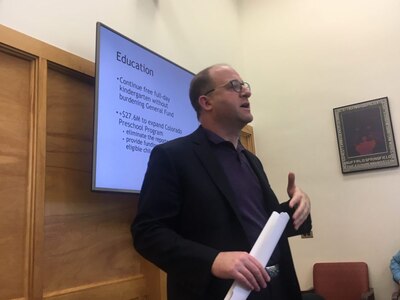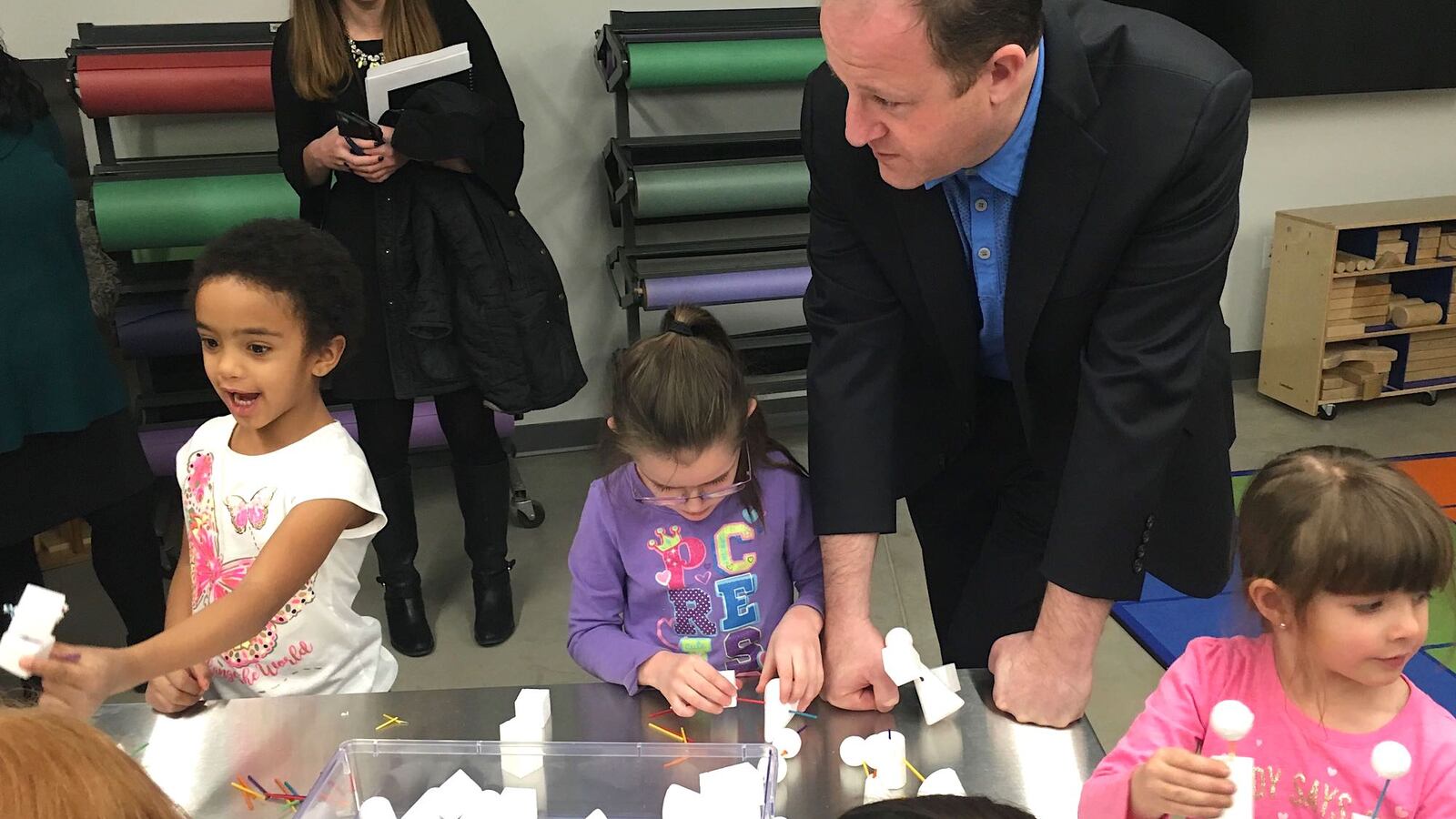After securing funding for full-day kindergarten in 2019, Gov. Jared Polis is pushing to fulfill another campaign promise by expanding access to preschool in his 2020-21 budget request.
Polis is seeking $27.6 million to add 6,000 new slots to the Colorado Preschool Program, which would allow Colorado to serve half of an estimated 80,000 eligible 3- and 4-year-old children.
This is one of the more significant education requests in a $34.5 billion budget proposal released Friday by the governor’s office.
The budget, which represents a 2.7% increase from this year, also includes:
- $26 million to limit tuition increases at state higher ed institutions to 3%
- $4.9 million for teacher scholarships
- $500,000 to expand loan forgiveness programs for educators
- $500,000 to support concurrent enrollment programs
- $1.2 million for apprenticeship programs
- $1 million to support schools trying to improve student performance before they face state intervention
- $3.5 million to bolster school safety.
The proposed budget also includes $500,000 to support improvements in the teacher evaluation system. Earlier this year, the Colorado Education Association, the state teachers union, failed in an effort to overhaul the program, which is deeply unpopular with teachers, but Polis had promised to look for ways to make evaluations more meaningful and less burdensome.
By law, Colorado’s governor must release his proposed budget on Nov. 1 for the next fiscal year. In reality, this document serves as a conversation starter and a way to announce priorities. Legislators on the six-member Joint Budget Committee release their own budget in the spring.
The members of that committee have already been grappling with the full costs of the ambitious legislative agenda pursued this year by Polis and Democratic lawmakers with majorities in both chambers.
In a press release, Joint Budget Committee Chair Rep. Daneya Esgar, a Pueblo Democrat, said she appreciated the budget request but sounded a cautious note.
“I look forward to developing a responsible and balanced state budget that prioritizes education and transportation and continues lowering the cost of health care for all Coloradans,” she said.
“Due to a strong economy, we were able to make historic investments in critical government services like education and transportation this year,” said state Sen. Dominick Moreno, a Commerce City Democrat and the committee’s vice chair. “However, due to the fiscal constraints imposed by TABOR, we will have to be more focused on cost savings next year.”
Policymakers have been waiting for final enrollment numbers to understand the real costs of full-day kindergarten.
They budgeted $175 million for the current fiscal year based on the assumption that not all school districts would participate and not all parents would enroll their children. But more participated, and estimates of the additional cost have ranged from $10 million to $40 million.
The Colorado Department of Education typically releases final enrollment numbers in January and flat or declining trends across the state could mean cost savings elsewhere.
Colorado’s constitution links school spending to annual changes in population and inflation, but each year lawmakers hold back money for other budget priorities.

Polis’ budget would hold back around $530 million from Colorado schools out of a more than $7 billion education budget. This is $40 million less than was withheld this year, and would represent the smallest amount withheld from schools since lawmakers adopted this budget practice during the Great Recession.
Republicans in the legislature criticized Polis for not making a greater effort to reduce these withholdings, long a top priority of education advocates.
Instead of paying back the withheld money, “Democrats have focused on creating new spending obligations that increase our baseline, year-to-year obligations,” Senate Minority Leader Chris Holbert, a Douglas County Republican, said in a statement. “We urge the governor and legislative Democrats to reconsider this path and pay back the education debt owed to Colorado school districts before creating additional spending obligations.”
The Colorado Education Association, the state’s largest teachers union, also said Polis should have done more increase baseline education spending.
“Educators are disappointed to see such minimal progress toward eliminating the budget stabilization factor, the ongoing cut to our public schools and students,” CEA President Amie Baca-Oehlert said in a press release. “The Colorado economy continues to blaze ahead even as students sit in class sizes way too large, without adequate mental health supports, and while their teachers still work two or three jobs to make ends meet.”
Polis made full-day kindergarten and expanding access to affordable preschool key parts of his platform during his campaign last year. The adoption of full-day kindergarten freed up about 5,000 new preschool slots because school districts stopped diverting money from the preschool program to pay for the second half of the kindergarten day for at-risk children.
However, lawmakers turned down a request for an additional 3,000 preschool spots for this year. The 2020 request is twice that.
“We know that quality education at a young age enhances social skills, improves learning outcomes, helps to identify special education needs more quickly, and even leads to higher postsecondary attainment,” the budget request states in justifying the additional preschool investment.
The state-funded Colorado Preschool Program provides free half-day preschool to 3- and 4-year-olds who come from disadvantaged families.
Even if the governor gets the full request, there will be challenges to creating that many new preschool slots, including a shortage of qualified teachers. That’s a longstanding problem in Colorado, driven by the field’s low pay and the common misconception that early childhood workers are low-skill babysitters.
Pointing out that the state offers higher wages, Polis downplayed any challenges to opening up more preschool spots.
The budget leaves $140 million in the state education fund as a reserve and seeks to increase the state’s overall reserves to 7.5% of expenditures.
Polis is also calling for $550 million in transportation spending, an investment that was cheered by Republicans, along with $10 million to create a new state park and improve existing park facilities and a 2% pay bump and new paid family leave benefit for state employees, among other new initiatives.
The budget is written to current law. If voters were to approve Proposition CC, the state could have hundreds of millions more for education and transportation, but schools could only spend that money on one-time expenses.


